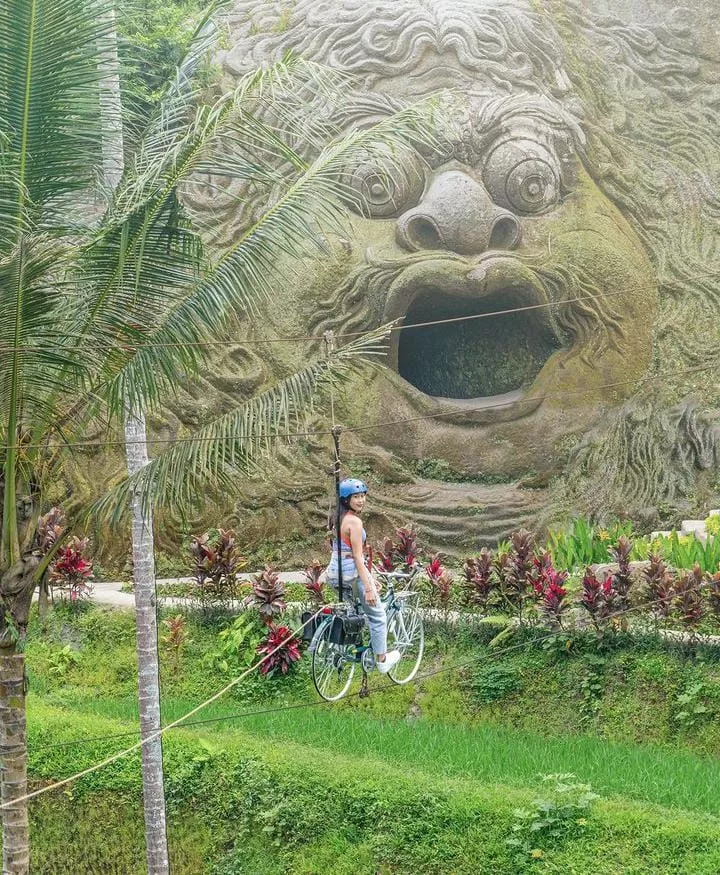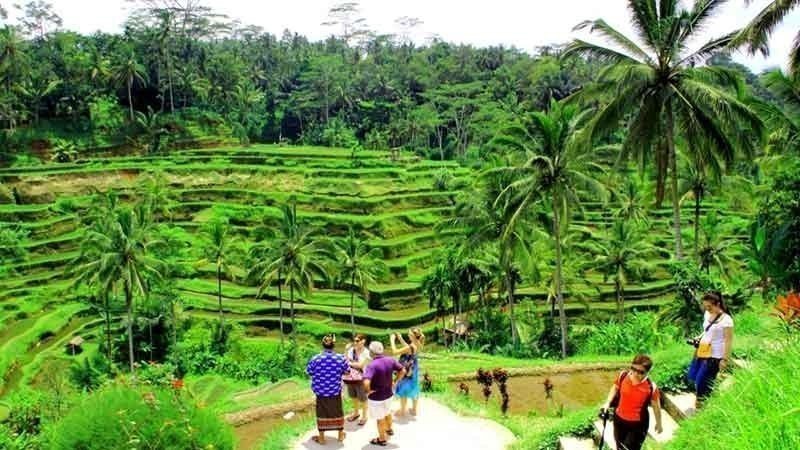How Agrotourism in Ubud Connects You to Local Culture and Nature
How Agrotourism in Ubud Connects You to Local Culture and Nature
Blog Article
Checking Out the Rich Culture and Impressive Landscapes of Agrotourism in Ubud
Ubud, commonly celebrated as the heart of Bali, provides an unique chance for those seeking to experience agrotourism that effortlessly mixes cultural richness with amazing landscapes. This fascinating destination uses a range of tasks, from engaging with the elaborate craftsmanship of local craftsmens to exploring the verdant rice terraces that define the region's agricultural heritage. As travelers navigate through Ubud's vibrant tapestry of traditions, they are invited to reveal the stories behind each social technique and landscape attribute. What exists below the surface of this fascinating experience is a detailed web of heritage and nature waiting for expedition.
Finding Ubud's Cultural Heritage
Snuggled in the heart of Bali, Ubud offers as a vibrant center for those excited to explore the island's abundant social heritage. Understood for its artistic practices, Ubud is a hub where old techniques meet modern-day expressions, developing an unique tapestry of social experiences. Site visitors are drawn to its myriad of holy places, galleries, and workshops, each providing a look right into Bali's historic and creative legacy.
Central to Ubud's social appeal is the Ubud Palace, a considerable site that stands as a testament to the area's imperial heritage. The palace frequently holds standard dance performances, offering an authentic understanding right into Balinese storytelling through dancing and music. The streets of Ubud are lined with galleries showcasing jobs of both distinguished Balinese artists and arising talents, mirroring the island's dynamic art scene.

Immersive Agricultural Knowledge

In addition, Ubud's agrotourism initiatives typically include workshops on sustainable farming practices. These workshops highlight the relevance of natural farming, permaculture, and biodiversity conservation, typically under the assistance of experienced experts. They act as an instructional platform for visitors, fostering a deeper recognition for the details of lasting agriculture.
Additionally, site visitors can discover coffee and chocolate vineyards, where they learn concerning the procedures of farming and manufacturing. Directed tours supply detailed descriptions of each step, from bean to cup or cocoa covering to chocolate bar, improving the general understanding of these significant farming products.
These immersive experiences not just enhance site visitors' understanding of Ubud's farming heritage but additionally promote lasting tourist methods, ensuring the conservation of these social landscapes for future generations.
Beautiful Rice Terraces and Landscapes
Building on the immersive agricultural experiences, site visitors are drawn to the captivating picturesque rice balconies and landscapes that specify Ubud's countryside. The subak watering system, a UNESCO-recognized social heritage, showcases a lasting and old technique of water administration that continues to support regional farming.
As site visitors go across the winding courses via the balconies, they are consulted with panoramic views that extend across verdant fields, punctuated by swaying coconut palms and the far-off shape of Mount Agung. The landscape supplies a calm background that invites reflection and appreciation of nature's beauty (Agrotourism in Ubud). For those thinking about photography, the ever-changing light and darkness cast by the sunrise or sundown supply plenty of possibilities for recording spectacular images
Past the balconies, Ubud's rolling hillsides and lush vegetation develop a varied tapestry that bids expedition. Treking routes meander through these landscapes, enabling visitors to get in touch with the land and experience the tranquil rhythm of country life.
Farm-to-Table Culinary Delights
Among the all-natural charm of Ubud's landscapes, the farm-to-table movement uses an authentic culinary experience that attaches visitors with the area's farming heritage. This method celebrates you can check here the symbiotic partnership between the land and its produce, with neighborhood farms providing fresh, natural components to Ubud's innovative chefs. Site visitors are invited to take part in a gastronomic journey where the beginnings of each active ingredient are transparently showcased.
In Ubud, farm-to-table dining goes beyond mere consumption; it ends up being an educational experience. Restaurants often use led scenic tours of the farms providing their kitchens, permitting diners to witness lasting farming practices firsthand. This link fosters a much deeper recognition for the meticulous care that enters into cultivating the crops and increasing animals.
The culinary offerings reflect the abundant diversity of Ubud's agricultural landscape, including recipes that highlight seasonal fruit and vegetables and standard Balinese tastes. From dynamic salads teeming with exotic environment-friendlies to aromatic curries infused with fresh natural herbs, each plate is a testament to the region's abundant harvests.
In addition, the farm-to-table ethos supports regional farmers and areas, making certain that agricultural traditions are protected while advertising economic sustainability. This motion emphasizes a dedication to quality, sustainability, and the event of Ubud's unique terroir.
Engaging With Regional Artisans
Several site visitors locate themselves mesmerized by the complex workmanship of Ubud's local artisans, whose work reflects the region's rich social heritage. These artisans, usually masters of their craft, add significantly to Ubud's dynamic social landscape. From typical batik fabrics to thoroughly sculpted wood artefacts, each item narrates linked with generations of experience and practice.
Involving with these craftsmens supplies an unique chance to dive much deeper into Balinese culture. Lots of workshops use hands-on experiences, where visitors can find out methods passed down with centuries. These interactive sessions not just foster gratitude for the craftsmens' skills but likewise offer a purposeful connection to the region's history and customs.
Site visitors can discover artisan villages such as Mas, renowned for its great timber carvings, or Celuk, popular for beautiful silver jewelry. Below, one can witness the dedication and precision required to create each work of art. Acquiring why not try this out directly from these artisans makes certain that the earnings support regional areas and sustain conventional techniques.
In Ubud, involving with regional craftsmens is not simply a traveler task; it is an improving social exchange that improves the agrotourism experience, leaving site visitors with a deeper understanding and admiration of Bali's artistic heritage. - Agrotourism in Ubud
Conclusion
The expedition of Ubud's agrotourism offers an extensive appreciation for Balinese cultural heritage and natural grandeur. The integration of typical dance, hands-on farming, and spectacular rice terraces produces an one-of-a-kind tapestry of experiences that mesmerize site visitors. The farm-to-table cooking offerings showcase the region's farming bounty, while communications with neighborhood craftsmens provide understanding right into Ubud's rich creative practices. Collectively, these components foster a much deeper understanding and recognition of Ubud's enduring all-natural and cultural attraction.
Central to Ubud's social attraction is the Ubud Royal residence, a considerable spots that stands as a testimony to the region's royal heritage.Ubud offers a myriad of immersive farming experiences that permit site visitors to involve deeply with the island's agricultural way of living.Building on the immersive farming experiences, site visitors are attracted to the exciting scenic rice terraces and landscapes that define Ubud's countryside.In the middle of the natural elegance of Ubud's landscapes, the farm-to-table movement provides an authentic culinary experience that connects site visitors with the region's agricultural heritage.Many use this link site visitors find themselves astounded by the intricate workmanship of Ubud's neighborhood craftsmens, whose work shows the region's rich cultural heritage.
Report this page